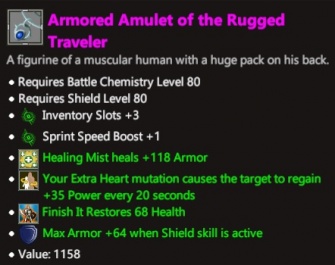Items
Contents
Item Tiers
Items appear to come in different "qualities". Note this may still change a lot during alpha.
Currently in Alpha, Project: Gorgon's loot mechanics have similarities to ARPGs. There seems to be few "set" items with fixed properties, associated with a specific dungeon or boss. Instead, high tier items have largely random mods that could be anywhere from a "bad roll" to an "amazing item".
As can be seen on the illustration, the properties on higher tier items can make a dramatic difference to your character's potential depending which skills you specialize in, from increasing damage output, to the resilience of your pets, lowering the cost of your spells, and even increase your Sprint speed!
| Common | Those are common, basic items. |
| Uncommon | One extra power, chosen as appropriate for the difficulty of the monsters. |
| Rare | Two or three extra powers, chosen as appropriate for the difficulty of the monster. |
| Epic | Two to four extra powers, with at least one power significantly more potent than lower tiers. |
| Legendary | Three to five extra powers, with at least one power significantly more potent than lower tiers. |
When a creature is slain, a special effect and distinctive sound indicates that there is Rare, Epic or Legendary loot on them.
Augments
Finding loot in Project: Gorgon is exciting because the game uses a "random treasure" system which is more commonly found in ARPG games. Players can occasionally strike gold with an amazing, game-balance-destroying item every now and again.[1]
For instance, if you’re an Unarmed fighter, you’ll love gauntlets that make your Punch attack heal you. You punch a lot, so that’s a huge power boost and very noticeable. On the other hand, you may prefer gauntlets that cause your Punch to do extra damage, or that cause your Cobra Strike to stun more reliably. But an amazing pair of gauntlets would do all three things.
Augments come in levels. For instance, the first tier of Health-Enchantment gives you +5 max health. The next tier gives you +10 health. And so on.
Here are a few examples of augments currently found in alpha:
- <ability> attacks heals you for 120
- <ability> causes your Sprint speed to increase by 10 for 10 seconds
- <ability> also restores 30 armor to you
- <ability> removes ongoing Poison effects (up to 30 dmg/sec)
Stacking Effects
Augments with the same name don’t stack. So you might find a helmet and a shirt that have “Enchanted Punch Damage +5″, but wearing both doesn’t give you a +10 bonus, just a +5 bonus. However, many abilities come in several flavors. For instance, there might be Enchanted Punch Damage (magically enhancing your fists), Comfort-Bonus Damage (you can hurt people more because your armor is so comfortable), and Placebo Effect Bonus (your punches do extra damage because you think they will). These have different names, so they all stack.[1]
Lucky Belts
Lucky Belts attune the random-treasure system to specific skills. Be sure to wear the proper belt so that the loot you find is much more likely to enhance your choice of primary and secondary skills.
Gear and Equipment Types
Item Mechanics
How Skill Mods on Items Apply
Skill mods such as "Scintillating Flame restores 20 Power" on an item work as long as the item is equipped, irrelevant if the item's associated skill is currently in use. So for example if the aforementioned mod was on a Bow, but you do not have "Archery" active, the mod still applies if you have Fire Magic in use.
Treasure Generation
It's far less likely for an item to have more than two skill requirements on it (Sept. 15 2014 Update).
References
- ↑ 1.0 1.1 http://www.eldergame.com/2012/05/gorgon-random-treasure/ Gorgon Random Treasure
